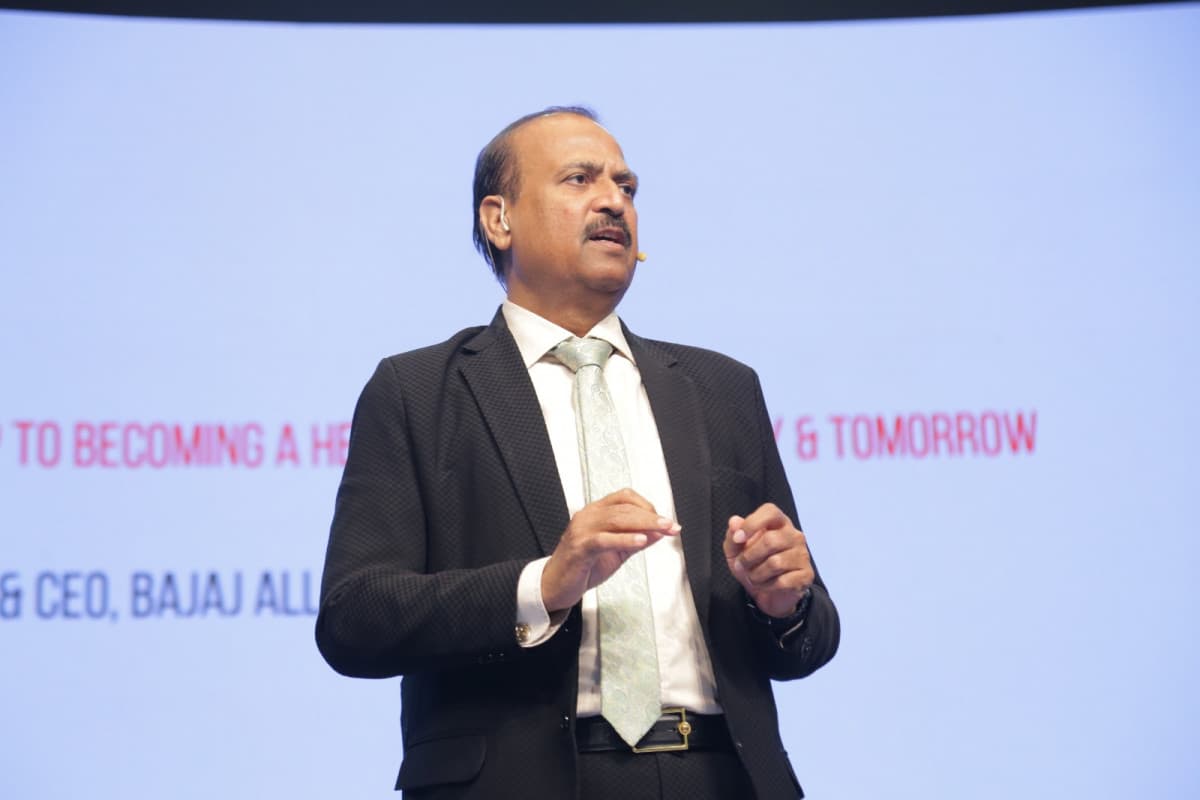Delivering an engaging speech at Outlook Money’s 40After40 Retirement Expo, Tapan Singhel, the Managing Director and CEO of Bajaj Allianz General Insurance, said that as the country is growing economically and becoming richer, it is also becoming unhappy and lonely for seniors and emphasised on the critical need for a comprehensive wellness strategy in India. Tapan Singhel began his speech by prompting the audience to reflect on the paradox of India’s economic growth and the apparent decline in happiness. “Our country has become richer. We have become the fifth-largest economy, and you’re talking about becoming the third-largest economy. But have you noticed that we have become sadder than when we were not so rich? Have you noticed in your own life that if you look back 10 years, you could say you were happy?”
Also Read: 40After40 Expo: From Depression Survivour And ‘Khota Sikka’ To Celebrity Model, Dinesh Mohan Reinvents Life
Debunking the myth that wealth is happiness, he said, “We are earning reasonable money. A crazy amount of wealth is not required to be happy. That is a myth which is debunked.”
Tapan Singhel emphasized the global trend among successful individuals who prioritise mindfulness, meditation, and a circle of friends for overall wellness. “Pick up anybody you admire or think is successful, and try to figure out their lifestyle. You’ll notice that this person talks of mindfulness. The second thing you’ll notice is doing some yoga and meditation. Mindfulness, exercise, and then you will see they have a group of friends, important factors for you to have a good life. And then they’ll talk about a moderate income level,” Singhel said.
Also Read: Now, You Can Access Cashless Facility Outside The Insurer’s Hospital Network
Singhel talked about the historical perspective of wellness in India, highlighting India’s traditional knowledge of holistic living. However, he lamented the loss of this knowledge. His speech touched on significant issues, such as the growing ageing population and their lack of financial coverage. “The country will propel you to become big economically. But look at the social issues. A huge number of elderly people are staying alone. They fend for themselves. Do we have a pension scheme sufficient enough for them to take care of themselves? No. Is the current generation thinking about retirement and savings? The answer’s no; we’re moving to a consumer-centric economy, which is good, but think about it,” he said.
“There is a huge elderly population, with successful kids across the globe, who would be staying alone. That’s the reality, and it (their numbers) will become bigger and bigger. Is the government thinking about it? As a society, are we thinking? All the statistics say that 7 per cent of Indians go below the poverty line every year because they can’t afford health expenses,” Singhel added.
He gave an example to underscore the financial hardship of people. “If you go to any hospital, try standing near the billing counter; you will come across people selling jewellery, selling land, and taking loans to pay for expenses. If somebody falls ill, the family will do their best (to protect them). They bring them to a big city for treatment, sell everything off, and when the person doesn’t survive, they go begging on the street. It is a harsh reality for 10 crore people in our country every year,” he explained.
In conclusion, Singhel outlined a three-pronged strategy to address these challenges. He said that making health insurance mandatory for employers is one of the solutions. Singhel added that creating a comprehensive ecosystem for older people and reintegrating traditional wellness practices into school education will go a long way in helping solve this issue. He urged people to talk about wellness and take steps towards making India a healthier and happier country.
Also Read: The Secret Recipe To Invest In A Bull Market




